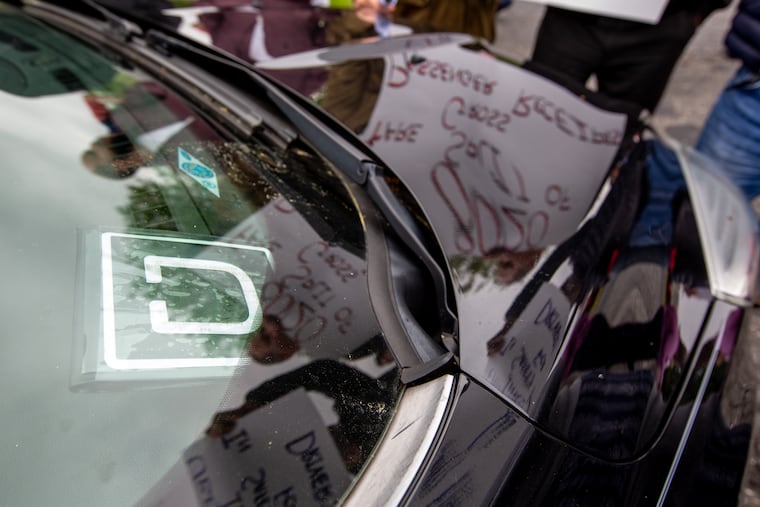Gig workers score a victory in Pa. Supreme Court ruling on Uber drivers’ unemployment benefits
The ruling gets at the heart of a debate that has roiled the app-based gig economy: Are Uber drivers workers at the mercy of a boss? Or are they entrepreneurs who are running their own businesses?

In August 2015, Donald Lowman Jr. found out that he no longer would be eligible for unemployment benefits because he had been driving for Uber.
The Philadelphia man, who had lost his job as a behavior health specialist, was “self-employed,” according to Pennsylvania’s Department of Labor and Industry, which meant he was disqualified from collecting unemployment.
Five years later, in a ruling hailed as a victory for workers in the ongoing struggle for gig workers’ rights, the state’s top court reversed that decision: Lowman, a majority of judges said, was not self-employed and should have been eligible for benefits.
The 5-2 decision sets the stage for app-based gig workers to get unemployment benefits and is part of a growing movement to get app-based gig workers protections they have not traditionally been entitled to.
Last year, in an effort to crack down on companies such as Uber and Lyft for what advocates called exploitative labor practices, California passed a law that made it harder for gig companies to classify their workers as independent contractors. And this week, a federal judge in New York ruled that Uber and Lyft drivers — many of whom have been waiting for months for unemployment benefits — must be paid the benefits like other workers.
The ruling gets at the heart of a debate that has roiled the app-based gig economy: Are Uber drivers just like any workers at the mercy of a boss? Or are they entrepreneurs who are running their own businesses?
Companies such as Uber and Lyft have sought to frame drivers as business owners, or independent contractors, rather than employees. “Be your own boss,” their ads read. These companies built their business models around employing an army of what they described as independent contractors, a classification of worker that isn’t entitled to legal protections such as minimum wage, unemployment insurance, and overtime. Last year, Uber, Lyft, and DoorDash spent tens of millions of dollars to fight the California law, which would make it harder for them to misclassify their workers.
But in recent years, a growing chorus of gig workers has said that not only is this classification exploitative, it’s inaccurate. In order to be classified as an independent contractor by Pennsylvania law, the contractor, among other things, must be “free from control” of the business they’re contracting with.
» READ MORE: What Philly can learn from some of the biggest victories around the world by on-demand gig workers
In a statement, Uber underscored that the court ”did not make a determination on the employment status of this driver, and the ruling does not say the driver was an employee.”
In other words, the ruling does not suddenly reclassify all Uber drivers as employees. What it does is make it easier for Uber drivers to get access to unemployment benefits, and sets a precedent for advocates to make a similar case: that these workers are not being treated as traditional independent contractors.
“However,” Uber said, “while this decision did not determine the driver’s status, we stand ready to work with the commonwealth to modernize our laws, so that independent workers receive new protections while maintaining their flexibility.”
The Pennsylvania Supreme Court’s decision is one of the first that has closely analyzed Uber’s relationship with its workers, said Julia Simon-Mishel, the Philadelphia Legal Assistance lawyer who argued Lowman’s case, and it concluded that in today’s work environments, “control” looks different than it once did.
“The court recognized what a lot of workers have been advocating for a long time,” she said, which is that “while the control that Uber exerts may look different than the control of middle management in a physical office, it is still control.”
The court pointed to numerous factors of this control, including GPS tracking, monitoring of Lowman’s work, and the fact that Uber controls the pay structure.
» READ MORE: How incentives in the gig economy put workers at risk
Angela Vogel, a leader in the Philadelphia Drivers Union, which organizes ride-share drivers, said it’s often hard for people who have never worked for an app company to understand how much the apps control workers.
“Just turn the app off,” she’d heard people say.
“Just being able to turn the app on and off does not eliminate control,” Vogel said, “especially not when the economic reality of most drivers is that we depend on this income.”
The court decision will not automatically make app-based gig workers eligible for unemployment benefits, Simon-Mishel said, but if they are denied, it gives them strong legal ground to appeal and prove that they are entitled to them.